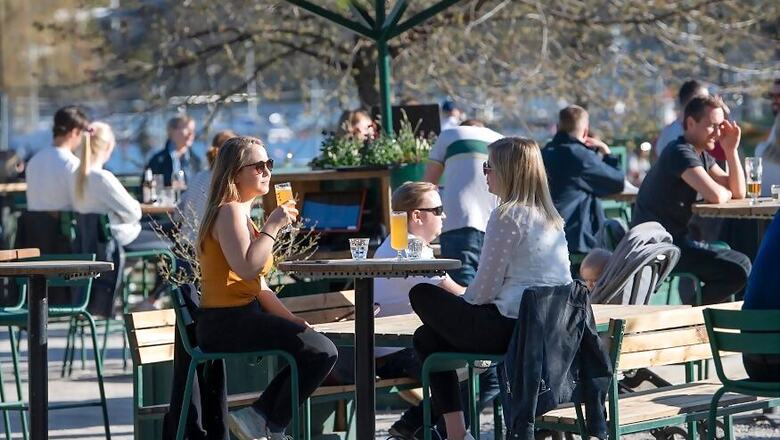
views
Sweden’s decision to go the other way in dealing with the dreaded coronavirus even as the world shut down may have paid off. A controversial strategy to keep public life open as much as possible and develop “herd immunity” against the virus is reportedly working.
It was aimed at allowing some exposure to the virus in order to build immunity among the general population while protecting high-risk groups like the elderly.
However, according to a CNBC report, Sweden’s chief epidemiologist said the strategy appears to be working and that “herd immunity” could be reached in the capital of Stockholm in a matter of weeks.
“In major parts of Sweden, around Stockholm, we have reached a plateau (in new cases) and we are already seeing the effect of herd immunity and in a few weeks’ time, we’ll see even more of the effects of that. And in the rest of the country, the situation is stable,” Dr, Anders Tegnell, chief epidemiologist at Sweden’s Public Health Agency, was quoted as saying.
He said data showed 20% of Stockholm’s population is already immune to the virus, and soon “we might reach herd immunity and we believe that is why we’re seeing a slow decline in cases, in spite of sampling (testing for the coronavirus) more and more.” However, the authorities are investigating into the mortality rate in elderly care homes, Tegnell said.
The country saw no lockdown, only restrictions of gatherings of more than 50. Schools remained open, public transport running, cafes and bars open with the restriction of table service only rather than crowding at the bar.
The policy of building “herd immunity” was something that Britain has also adopted initially for a while, as advised by scientists, but later, changed course as the virus started spreading rapidly.
Under such a policy the virus should actually be allowed to spread. The logic is that this will not affect most people seriously; those who get it, and get over it, can then get on with their lives and with their jobs.
It threatens only the vulnerable who should be advised isolation. They can be welcomed back to normal living once the virus has run its course so that they can no more be infected, because they will interact with only those who’ve had it already.
In Sweden, an advisory, and just that, has been issued for those above 70 to maintain social distancing. And people have only been advised to try to work from home as far as possible; no shutdown across work places. Later, the government banned visits to care homes for the elderly.
However, people across the country reportedly practised a degree of social distancing, though that was nothing close to a lockdown -- no sight of deserted public spaces that we see now around the world. Its cinema halls too are open.
More than 2,000 scientists had signed a petition asking the government to bring in tighter measures over social distancing. Even the Chairman of the Nobel Foundation, Prof Carl-Henrik Heldin, had issued a statement saying “we have let the virus loose… they are leading us to catastrophe.”
This is the path that Britain had set out on before a group of 229 scientists warned the government that such a policy could lead to up to half a million deaths by August.
The British government swung into an abrupt U-turn following that warning. And all of Britain now lives in the fear that its government could have lost precious time, and reversed its ways too late.
The policy, said a senior doctor with the National Health Service in Britain, is not just dangerous but “immoral”. Allowing the virus to spread presupposes that the elderly, the ill and the weak can be blocked effectively from catching it.
If not, the policy opens them to a greater risk. It’s potentially a policy to sacrifice the vulnerable for the rest to get on with it, he said. Who’s to say that catching the virus builds immunity that cannot be breached. The common cold is a virus, and people catch it again and again.
The Swedish government has built its policy on the argument also that no lockdown can be maintained long enough and fully enough to stop the spread of the virus physically.
Blanket prevention is not possible, only a managed spread is. That reasoning now faces the test of time in Sweden and in the rest of the world, in opposing ways.



















Comments
0 comment